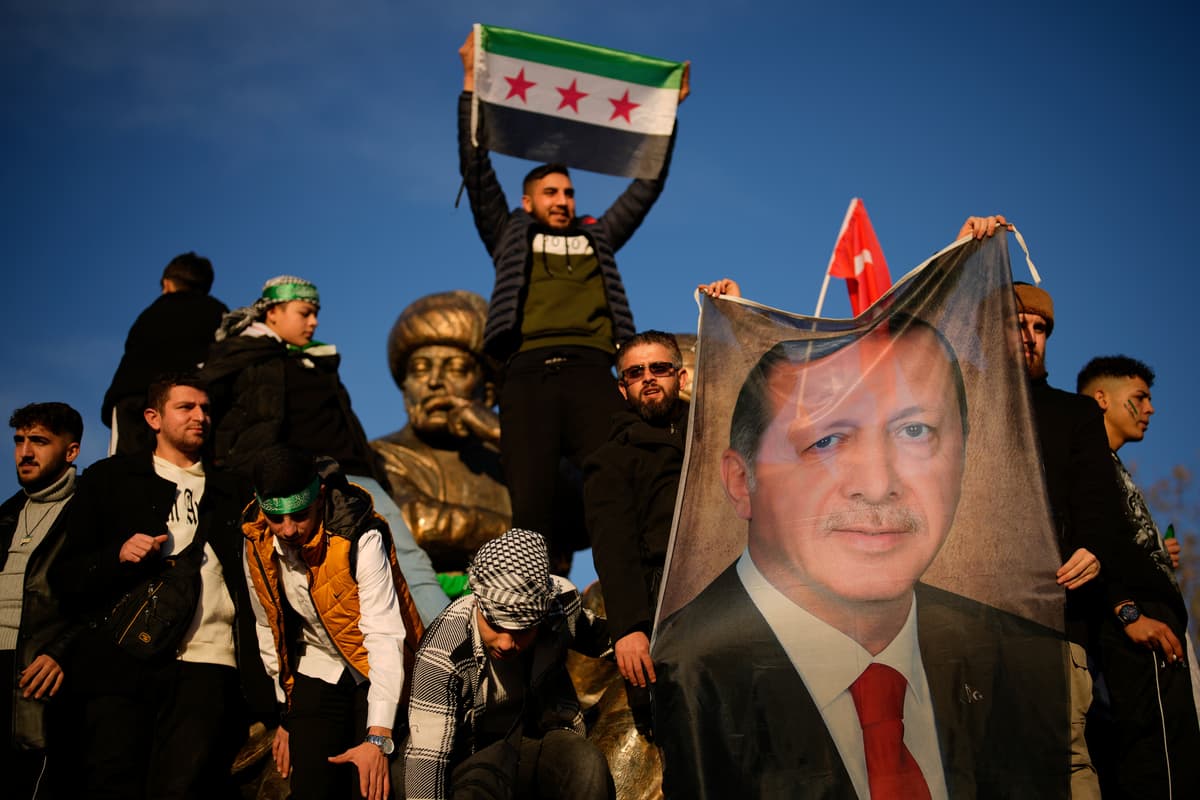For a Sneak Preview of New Turkish Designs on Syria, Feature What’s Happening in the Greek Islands
Bit by bit, from the eastern Mediterranean to the sands of Aleppo, President Erdogan seems intent on reconstituting some newfangled version of the Ottoman Empire.

January in Syria will likely be less dramatic than the previous month which saw a dictator’s departure, but that doesn’t mean regional powers are going into hibernation — far from it. Earlier this week the dominant post-Assad power broker in the region, Turkey, made it clear that it will not hesitate to jump in and wield such power as it sees fit.
At a press conference on Monday, President Erdogan said that “We will not consent to the disintegration of Syria or the disruption of its unitary structure under any guise. If we see a risk in this regard, we will take the necessary steps swiftly.” That was a reference to the Kurdish groups that still operate in parts of Syrian territory, particularly in the northeastern areas near the border with Turkey.
Some of those groups are backed by America as part of an effort to combat ISIS in the region. Ankara, however, takes a different view of the Kurds, branding some units of the Syrian Democratic Forces as terrorists. “The only fate awaiting those who choose terror and violence is to be buried in the ground with their weapons,” Mr. Erdogan also stated, adding “I am saying this openly, no power can prevent this.”
The Turkish president is in effect staking out a position in Syria that might be compared to a bird of prey guarding its nest against predators — perceived or otherwise. Turkey has invested in Syria, having backed the rebel group Hayat Tahrir al-Sham that now forms the core of the country’s transitional government led by Ahmed al-Sharaa, also known as Abu Mohammed Al-Golani.
Many in the West seem unaware of the extent to which Turkey has inserted itself into Syria — arguably preying on the disintegration that started more than a decade ago with the Syrian civil war. In the eight years before the Assad regime crumbled on December 8, HTS rebels operated largely in Idlib province, territory adjacent to the Turkish border. They coexisted with some of Ankara’s proxy militias as well as Turkish military outposts.
In Idlib the Turkish lira replaced the Syrian pound, Internet access was provided by Turkish companies, and mail was delivered by the Turkish postal service: the area became a de facto province of Turkey. This is a slow and steady kind of infiltration, in contrast to the military invasion which a half-century ago led to Turkish occupation of a wide swath of Cyprus that continues to this day.
From the eastern Mediterranean to the sands of Aleppo, the signs that bit by bit President Erdogan is intent on reconstituting in some newfangled form a new version of the old Ottoman Empire. Ideologically, Mr. Erdogan has positioned himself as a champion of Sunni Muslims, which in Syria meant not only abandoning Assad but also downplaying the problems caused when jihadists streamed into Syria from Turkey to join ISIS and Al Qaeda.
The fact that Turkey is playing a long game in Syria does not mean that it has abandoned its confrontational stance in the Aegean either. Last month a former Turkish defense minister, Hulusi Akar, said that the Greek island of Kastellorizo “somehow ended up belonging to the Greeks” and that it is “within swimming distance” of the Turkish mainland. He added that “God willing, there will come a day when we will do it.”
It is worth recalling that Turkey is already working on a maritime jurisdiction agreement with the new Syrian government. For the Turks, Greece’s exclusive economic zone around Kastellorizo is perceived as encroaching on their own, and this pattern repeats throughout much of the Aegean Sea.
It is more than rhetoric. This week Turkey is holding its Blue Homeland drill “in Türkiye’s seas.” According to Greek press reports, the drill involves a total of 87 surface ships, seven submarines, seven unmanned naval vehicles, 31 aircraft, 17 helicopters, 28 unmanned and armed aircraft, and 20,000 personnel, including underwater attack and defense teams.
On the Mediterranean’s easternmost shore, in Syria, other Turkish campaigns are moving forward. As the Financial Times first reported, the new HTS government is already coming under fire for trying to impose an Islamist agenda on the education curriculum.
One of the changes, according to that report, is replacing the phrase “nature’s bounty” in a first-grade science book with “Allah’s bounty.” Another is expunging a reference in a 12th-grade history book to a 1916 mass execution of Arab nationalists under the Ottomans.
That day is commemorated as a public holiday in Syria and Lebanon. It appears that on the ground in Syria as well as in the seas around it, Turkey is working overtime to blur the lines — sometimes behind the scenes and, more worryingly, in plain view.

